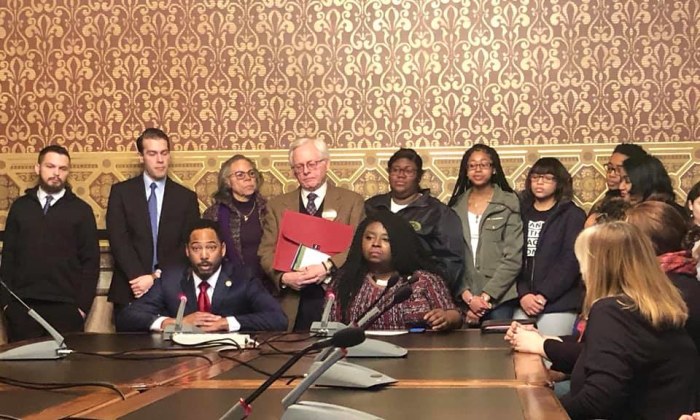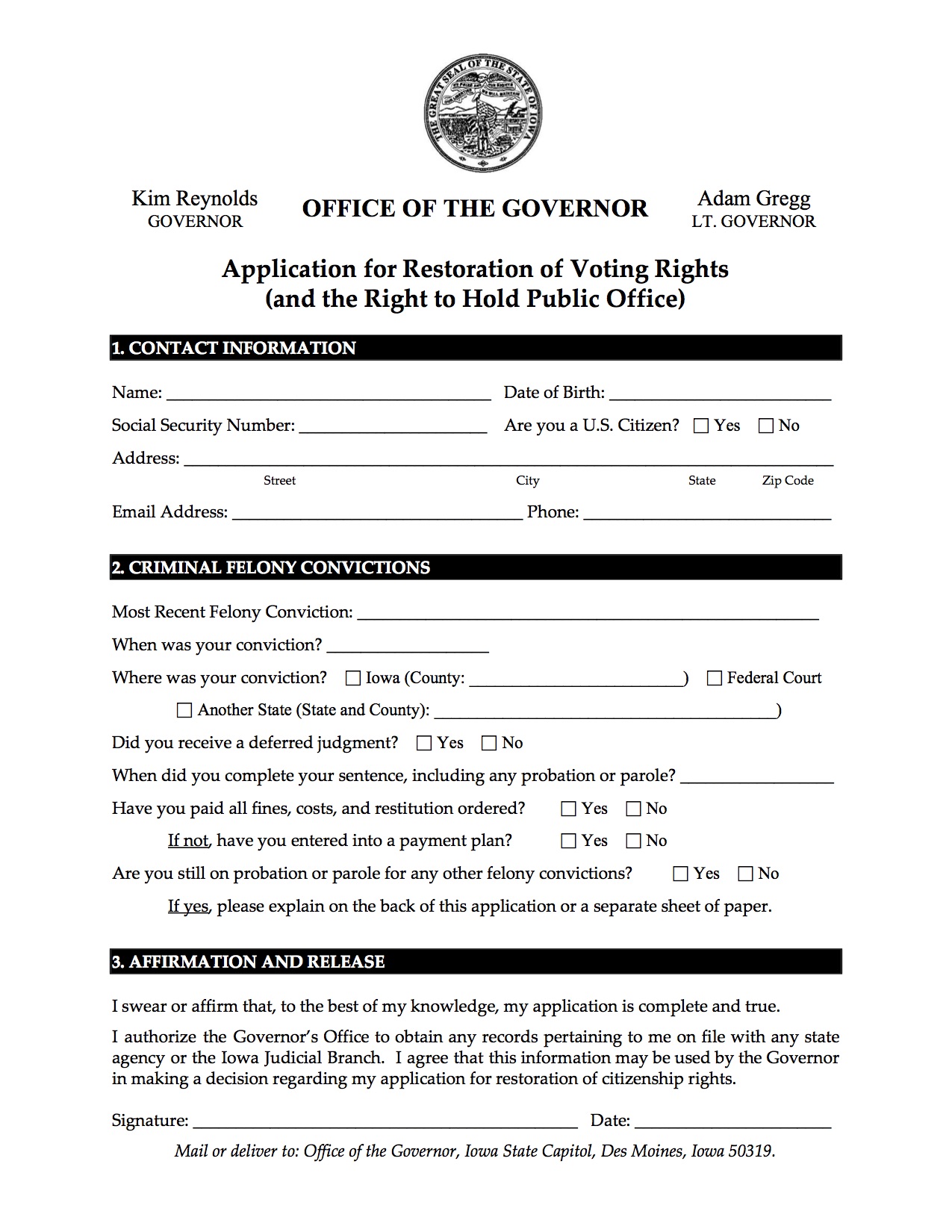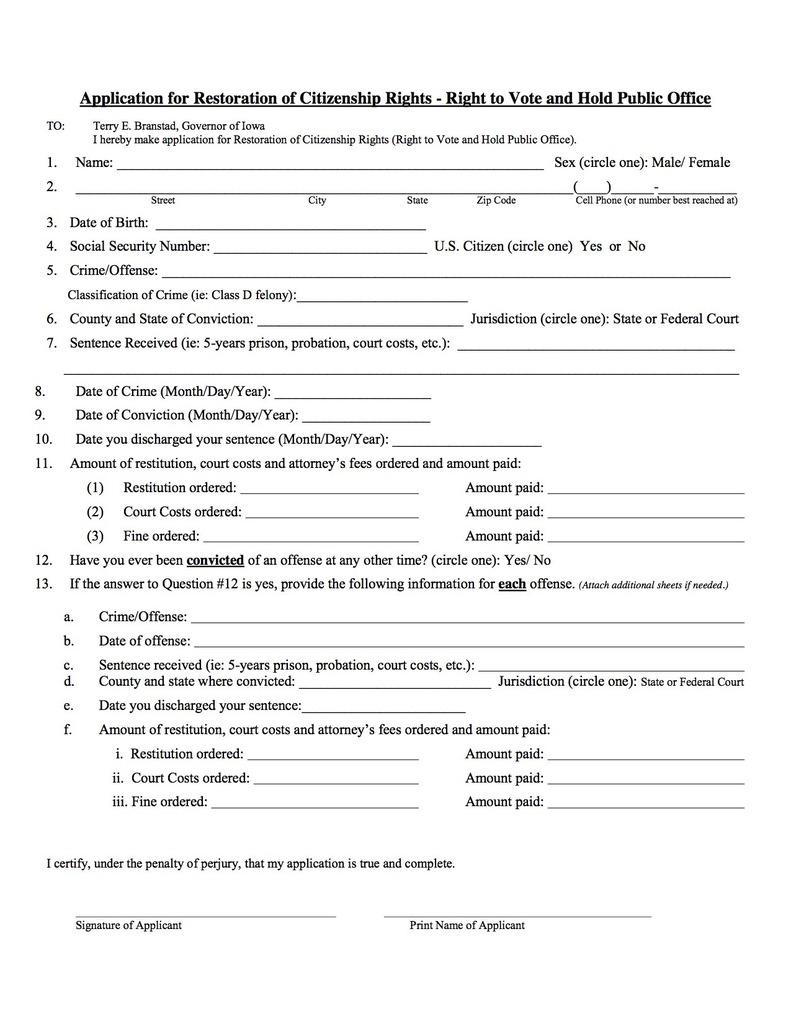Since Governor Terry Branstad signed an order in January 2011 to end automatic restoration of voting rights for Iowans who have completed felony sentences, only 328 affected people have regained their franchise: 206 through the end of Branstad’s tenure, and 122 since Governor Kim Reynolds became the state’s leader in May 2017. Yet an estimated 52,000 Iowans are ineligible to vote because of a criminal record.
A constitutional amendment moving through the state legislature would end the lifetime ban for most Iowans with felony convictions but could not take effect until 2023 at the earliest.
Today Reynolds announced several steps aimed at increasing the number of Iowans who could participate in the electoral process sooner than that.
Two supporters of the new policy joined Reynolds at her March 12 news conference: Betty Andrews, president of the Iowa-Nebraska NAACP, and Drew Klein, state director for the conservative group Americans for Prosperity.
The NAACP has worked for many years to improve Iowa’s felon disenfranchisement policy, as part of the organization’s broader criminal justice reform agenda. (Iowa is one of the worst states for racial disparities in the justice system.) Americans for Prosperity only recently engaged on this issue, but their lobbying has helped bring around Republican lawmakers.
Reynolds described the goal as “trying to do our best to eliminate potential burdens” to the process. In developing new practices, her staff consulted with stakeholders including the University of Iowa Legal Clinic, the NAACP, the Department of Public Safety, the Department of Corrections, and the League of Women Voters. Key points:
A shorter, simpler application form.
Two “streamlinings” of the application form during Branstad’s tenure failed to meaningfully increase the number of Iowans seeking to regain their voting rights. Reynolds restored rights to just 35 people in her first year as governor.
A news release explained,
The new application unveiled today is simplified and easier to understand. It requests only the information necessary to appropriately consider whether an Iowan is eligible to have their voting rights restored. It removes the requirement to submit a criminal background check and the related $15 fee. And it no longer requires the collection of redundant financial documentation that can instead be verified online.
Here’s the new form.
It’s clearly more user-friendly than the form introduced after Branstad’s second “streamlining” in May 2016. (At that time, the Iowa Supreme Court was considering a lawsuit challenging the felon disenfranchisement system.) Here’s the previous form:
A faster review.
Reynolds said her office will attempt to process all voting rights applications within one month.
Outreach to newly eligible voters.
According to the governor’s news release, “The Iowa Department of Corrections and local Community Based Corrections districts will also be distributing the new application to Iowans as they discharge from prison, parole, or probation.”
I’m seeking comment on whether Iowans who completed their felony sentences years ago will also receive an invitation from the governor’s office to apply for a restoration.
Speaking at today’s news conference, Andrews thanked Reynolds for her actions while emphasizing the NAACP still favors an executive order to set up an automatic process for restoring voting rights. I concur.
That said, unlike the ineffective steps of past years, the latest changes should significantly increase the number of Iowans who can exercise their fundamental constitutional rights in upcoming elections.
Top image: Betty Andrews (seated, right) and others involved with the NAACP in Iowa advocate for a constitutional amendment on voting rights at a House Judiciary subcommittee meeting on January 31. Photo by State Representative Mary Wolfe. I’m using this picture, rather than one from today’s news conference, because the NAACP have long been among Iowa’s most committed champions to expanding voting rights.



